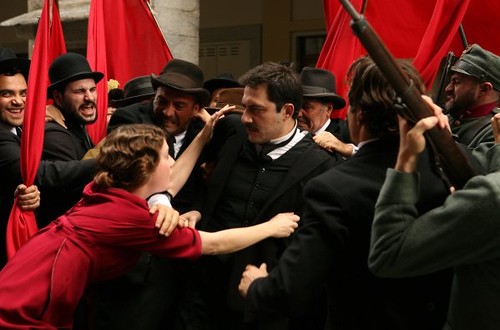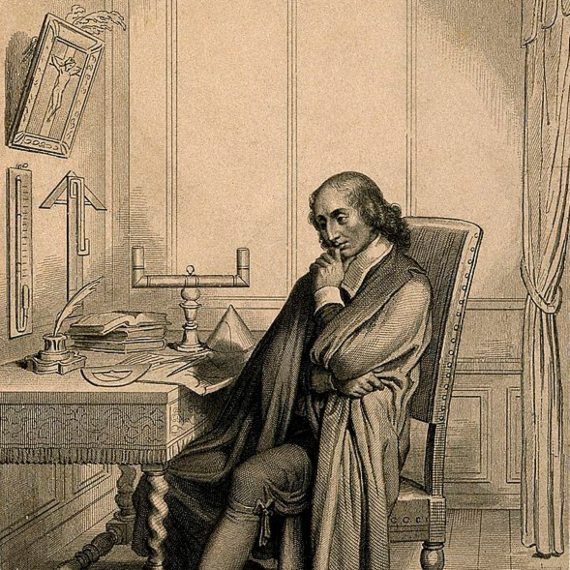Democrazia e arte
 Thursday, January 12, 2012 at 16:40
Thursday, January 12, 2012 at 16:40 An essay ("Democracy and Art") by this Italian man of letters. You can read the original here.
In my opinion we commit an abuse, if not a play on words, when we say 'aristocratic art.' In every work of art there is always a technical part that cannot be penetrated, understood or savored except by those who have at least been initiated, or by those whose studies specialized in the field. But this work of art always contains an ideal foundation, an arsenal of sentiments, all of which triggers such passions and breathes life into such images that the populace gains an understanding. Through these sentiments the populace feels itself to be in spiritual communion with the work; that is why the populace feels part of it, relives it, and receives from it an illusion of a better life. And for this reason it palpitates and rises with a force of ascent that it did not know it possessed, all of which is akin to the effect of a suggestion.
 In order that the artist place himself in a direct relationship with the soul of society, precisely this power of sympathy, which both influences and dominates this soul, constitutes the popularity of a work of art. So when we say 'aristocratic art' we cannot but mean that artificial and well-crafted art consisting solely of an ingenious combination of words, of verses, of rhymes, made in accordance with the precepts and caprices of a special poetic code, manipulated and accepted by a privileged cenacle, and living outside the movement of contemporary life. The art, in short, of the Euphuists, of the Alcovists, of the Parnassians, of the Pre-Raphaelites, of the Decadents: the mechanical art of John Lyly and de Góngora, of Marino and Bainville.
In order that the artist place himself in a direct relationship with the soul of society, precisely this power of sympathy, which both influences and dominates this soul, constitutes the popularity of a work of art. So when we say 'aristocratic art' we cannot but mean that artificial and well-crafted art consisting solely of an ingenious combination of words, of verses, of rhymes, made in accordance with the precepts and caprices of a special poetic code, manipulated and accepted by a privileged cenacle, and living outside the movement of contemporary life. The art, in short, of the Euphuists, of the Alcovists, of the Parnassians, of the Pre-Raphaelites, of the Decadents: the mechanical art of John Lyly and de Góngora, of Marino and Bainville.
Now if democracy could come to kill this art of the refined and the haggard, we should have nothing to complain about; in fact, we should be elated since everything that is false does not have a right to human life. But democracy probably will not even notice these loons, who confuse a work of art with a rebus or a puzzle, and will leave them to delight and indulge themselves in their void. If democracy could destroy art, it ought, first of all, to destroy the organic and physiological conditions of genius, restrict the concomitant cerebral convolutions, and diminish the weight of the brain. But the day that democracy were to produce in the populace such a cerebral degeneration would be the day the populace would vanish from history. The struggle for life is the supreme law of the populace; the most powerful force in this struggle is precisely intelligence, and if democracy decreases intelligence and suppresses genius, it will deprive itself of all possibilities of triumph and survival. This seems to be a steep price to pay.
On the other hand, we see that the nations or peoples who triumph in terrible battles are exactly those which manufacture the greatest number of ingenious devices, namely, instruments and arms more precise or better suited for victory. Could it be said, then, that scientific genius in such a case may be the product of the new democratic society and that poetic and artistic genius would not have a reason to exist? Yet nothing reasonably induces us to imagine a society of men so alien to all elevated and generous passions, so deaf to all the great emotions that the spectacles of nature produce in all living things, that it would not concede any place to the manifestations of art. Science itself, considered the enemy of the life of art by hypochondriac or superficial minds, constantly opens new horizons to the genius of the poet and the artist, and liberates for him more and more the flight towards the infinite.
It has also been observed that for a work of art to be born and to live, it has need for certain societal and political conditions which democracy would not be able to furnish. Thus has the last trench of the pessimists been gloriously broken by the arguments of Vittorio Alfieri and Ugo Foscolo, by now so old and doddering in all its elements that I really do not know by what shamelessness on our part they may be confined. For an artist to be able to work he mainly has need for liberty. This liberty is doubtless greater in a democratic government. Thus it does not make sense as to how democracy could possibly be the enemy of art when it affords it the primary and most essential condition of its existence, that of liberty. Furthermore, the artist has need for a certain independence from the daily necessities of living: there are activities, in other words, from which came the mouthfuls of food that Berlioz would eat at the feet of the statue of Henri IV.
Now the artist who can and knows he can use his talents freely in a democratic government and produce works worthy of the attention of a greater number of citizens, is certainly in a better position to earn his mouthful of bread that day than both the artist constrained to placate a despotic government or the artist obliged not to displease a prince, from whom, in the end, one may expect meager subsidies, a quandary that has persisted for many centuries from the satire of Ariosto, to the weepings of Tasso, to the adulations and threats of Aretino. If the life of poets and artists at the courts of princes – especially Italian princes – was miserable, it has now become a most common thing: and the portent of democracy reducing them to greater misery is contradicted not only by logic, but also, on a daily basis, by facts. Indeed, the more that States approach the democratic ideal, the less difficult will become the life of all men of genius, for whom the nascent liberty always opens new pathways and honors for their livelihood, increases those conditions favorable to the impartial appreciation of their works, and provides the tools for the rapid and broad diffusion of these selfsame works. This liberty also protects their rights and augments their compensation in accordance with the pleasure and utility which these works bestow upon the greater number of persons.
Now it not infrequently happens that the most sublime and brilliant works are misunderstood, or not understood, or neglected. This occurs at the present time as it has in every other era, in Italy and elsewhere, because a work of genius is essentially rebellious and anarchic. It tends to modify the social environment, and will never be able to be fully appreciated until the conditions of this environment have been changed and the minds of men are driven by historical forces towards that luminous ideal first espied from the darkness by the genius with other eyes. An ideal towards which he turns all the power of his flight and all the enthusiasm of his generous soul. Moreover, if history offers us very few examples of geniuses fully understood during their time, I do not believe that library and archive researchers of any countries can boast of having discovered geniuses who remained not understood and obscure for many centures in their respective nations. Genius is sooner or later recognized; and if its epoch does not come to understand it, it will also leave us traces which will reveal it and make it admired in the future.
In centuries past the greatest danger to an artist and to a philosopher was to see, along with his body, his work devoured by flames, damned by errors and predominant prejudices. But in this case we also see his work, if not his life, emerge victorious from ruination, and from the sacrifice of the author, we see it succeed as something almost sacred and imposing to the hearts and minds of mortals. In fact, I do not believe that it would be possible to name a work of any scientific or literary value which has been destroyed and erased from the memory of man by the efforts of political or religious fanaticism, which have committed so many works to abomination and to the flames.
And so, if a work of genius always emerges victorious from the innumerable obstacles and dangers it has traversed surrounded by tyranny, one is forced to conclude that the improvement of political and social conditions in accordance with democratic ideals will make the manifestation of genius even easier and its power more widely diffused. And its victory less hard-won.




